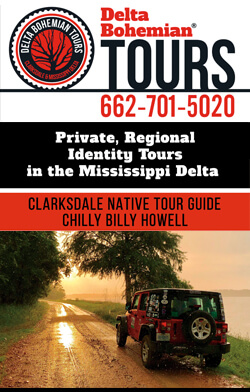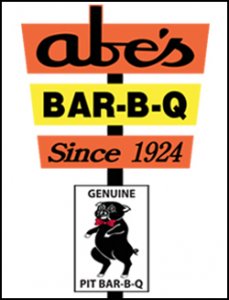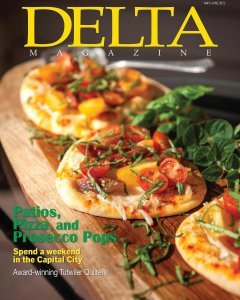
The William “Bud” White Family. 1952
By Guest Bohemian Jaby Denton
In 2011, while digging through a box full of vintage photographs found on the dusty shelves in the primitive office of the Quitman County Democrat, I came across a photograph that cut me to my core. The expressions of grief and pain of a rural family surrounding a little girl’s lifeless body could not have been more compelling. With much reservation I posted the picture on my Facebook page, “Marks, The Good Old Days.”
Incredibly there was a comment from a woman named Flossie White Self who said not only was this her family, but she was willing to share their story. I wrote the The Sharecropper Family to honor the lives of the forgotten Delta sharecropper families, the Whites in particular, and their beloved, lovely, little “Dolly.”
I am Jaby Denton, a cotton farmer of 45 years in Quitman County who loves the culture, the life, and the history of all of our proud Delta people.
THE SHARECROPPER FAMILY
In the 1950’s mechanization was transforming the traditional cotton farms of the Mississippi Delta and Quitman County. The need for mass labor was decreasing and slowly but surely a migration of the labor market was leaving the farms for manufacturing jobs in the “cities.” The rural landscape would be changing, and with it a bond that created a special working class family, the “sharecroppers.”
Sharecroppers were farmers who neither owned land or had adequate capital to be independent farmers. They relied on the landowner to provide land and often furnish materials for crop production in exchange for a “share” of that crop. It was a difficult life, requiring every member of the often large family to work the crops to sustain the family’s livelihood. These families were otherwise self-sufficient. In addition to the crops they would grow large gardens, raise poultry and livestock to make sure there was always adequate food on the table.
The dependence of the landlord often was disadvantageous to the sharecropper, as the net results of a year’s labor often left little monetary benefit to the family. But what the sharecroppers of the 1950’s lacked in earthy prosperity they more than made up for in priceless treasures. For these families knew the true meaning of family. To them each life was valuable not only for the labor it produced but the camaraderie it provided in the isolation of their existence. To them life was the farm and family, there was little time for anything else.
The Bud White family was no exception. They sharecropped on the old N. E. Stoddard plantation near Lambert, Mississippi. This family extolled the virtues of hard work, perseverance in the sight of adversity, and the love of God and family. In a family of fourteen, there was no absence of mouths to feed nor hands for work. Each family member had a chore to do for the subsistence of the family unit, and what was expected was performed without hesitation from the oldest to the youngest. For this was survival, and it taught each of them valuable life lessons not taught in text books or fine universities. Lessons that would carry each one beyond the sharecropping era into today’s post modern time when such virtues often seem nonexistent.
Beyond the toils of work there was plenty of time for playful activity and fun. Life was good for the White family, especially Saturday nights when they surrounded the Philco radio, listening to the Grand Ole Opry. But there were also dark days like November 6, 1952.
Like other sharecropper families the children had been out of school for six weeks to help gather the crop. The season was changing and all hands were in the fields, dragging their cotton sacks down the muddy rows with their gnawed fingers gathering enough lint to help cover the year’s furnish. The youngest children were playing around the old Case tractor, parked nearby to pull the cotton wagon with the last load of cotton to the nearby gin.
They delighted in imitating their father as they sat in the hard cast iron seat. Little seven year old Mary Margaret, affectionately called Dolly, was sweet yet feisty. She was swinging on the steering rod of the tractor awaiting the days harvest to be loaded. In the melancholy of the moment the shiny starter button was too much to resist. The tractor engine ignited and without hesitation the old Case lunged forward. Dolly tried to maintain her balance, but fell head first against the tractor as it pushed forward, it’s tire rolling over her fragile little body.
Still breathing, she was gathered up in her panic stricken Mother’s arms and rushed to the nearby Lambert Clinic. There Dr. Jimmy Walker immediately seized on the extent of her injuries and the limitations of his country practice. In an effort to save this well respected family’s little angel she was rushed to Memphis. While X-rays were being taken at Baptist Hospital to evaluate the extent of her injuries, she took her last breath and expired. Little Dolly was lost!
The innocence of her lifeless body brought a surreal aura to the family living room as she was brought back to her country home for the last time. The family gathered around her and mourned their loss, the departure of a little sister, a daughter, and the loss of this precious little girl whose laugh would no longer echo across the fields. What would her life have been like they would imagine, and what dreams of hers would never be fulfilled?
As the seasons parted life went on for the grieving White family. There was no choice but to continue forward. Winter was settling in and within months the fields would warm as yet another crop would need to be planted. So was the life of the sharecropper family.
Looking back on these times we realize that little Dolly’s prophecy was fulfilled. It was fulfilled in the hearts and lives of her surviving siblings who each went on to live joyful and prosperous lives for themselves and the generations of succeeding White families. Lives that were lived in joy not despite their sharecropper heritage, but largely because of it.
This is the legacy of a fine American family, blessed with the stain of the earth on their hands and the glory of a better life that came from it. For us little Dolly should be a reminder of the sacredness of life and the promise of an eternal life in God’s kingdom for His little children. May God continue to bless Dolly’s surviving brothers and sisters, and all the generations of White’s that follow her.
In memory of :
Mary Margaret “Dolly” White 1945- November 6, 1952
William “Bud” White, Father
Lillian White, Mother
William A. White (1929-2007)
Tommie L. White (1932-2007)
Oma Lee White (1937-2007)
Jimmy D. White (1943-1993)
Elsie Mae White Wiggs (1937-2013)
Elbert A. White (1939-2014)
In honor of :
Kenneth W. White
Flossie White Self
Joyce Faye White
Peggy Jo White
Robert E. White
Larry Glen White
Thank you Flossie White Self for her collaboration in this story.
Publisher notes:
We are pleased to share this story, originally published by Jaby in 2011. This lifelong friend of mine is spreading the good news in Quitman County and has been, quietly, for quite some time. We look forward to sharing more of his ruminations.
Many of you may already know Denton in a way. Perhaps while driving along a Mississippi Delta highway you have seen one of the painted messages on the sides of his cotton modules in Quitman County. Here are a few.

Mississippi Delta Cotton Module Message – by Jaby Denton

PICK JESUS – Mississippi Delta Cotton Module Message – by Jaby Denton. 1994 Belen

Mississippi Delta Cotton Module Message – by Jaby Denton

Mississippi Delta Cotton Module Message – by Jaby Denton

Mississippi Delta Cotton Module Message – by Jaby Denton

Mississippi Delta Cotton Module Message – by Jaby Denton










I was born in 1947. This could have been my Mama’s family,, change the name and the tragedy. .
Touching and educational story. Thank you for sharing. May the Delta stay strong!!
Mr. Bud and his wife Lillian and all their children were our neighbors for a few years. My sister, Jimmie Nell and I played with them almost every day. Elsie May and Oma Lee were my age. My sister was two years younger than us. We had so much fun together. Losing Dolly was a real tragedy. Thank you for this article. I enjoyed reading it so much and it brought back so many memories. They were some of the best neighbors we ever had and could not have been any nicer, a great family.
I would love to have a copy of this article. I tried to print it but could not.